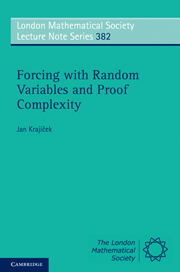Book contents
- Frontmatter
- Contents
- Preface
- Acknowledgements
- Introduction
- PART I BASICS
- PART II SECOND-ORDER STRUCTURES
- PART III AC0 WORLD
- PART IV AC0(2) WORLD
- PART V TOWARDS PROOF COMPLEXITY
- PART VI PROOF COMPLEXITY OF Fd AND Fd (⊕)
- PART VII POLYNOMIAL-TIME AND HIGHER WORLDS
- PART VIII PROOF COMPLEXITY OF EF AND BEYOND
- 27 Fundamental problems in proof complexity
- 28 Theories for EF and stronger proof systems
- 29 Proof complexity generators: definitions and facts
- 30 Proof complexity generators: conjectures
- 31 The local witness model
- Appendix: Non-standard models and the ultrapower construction
- Standard notation, conventions and list of symbols
- References
- Name index
- Subject index
31 - The local witness model
Published online by Cambridge University Press: 05 November 2011
- Frontmatter
- Contents
- Preface
- Acknowledgements
- Introduction
- PART I BASICS
- PART II SECOND-ORDER STRUCTURES
- PART III AC0 WORLD
- PART IV AC0(2) WORLD
- PART V TOWARDS PROOF COMPLEXITY
- PART VI PROOF COMPLEXITY OF Fd AND Fd (⊕)
- PART VII POLYNOMIAL-TIME AND HIGHER WORLDS
- PART VIII PROOF COMPLEXITY OF EF AND BEYOND
- 27 Fundamental problems in proof complexity
- 28 Theories for EF and stronger proof systems
- 29 Proof complexity generators: definitions and facts
- 30 Proof complexity generators: conjectures
- 31 The local witness model
- Appendix: Non-standard models and the ultrapower construction
- Standard notation, conventions and list of symbols
- References
- Name index
- Subject index
Summary
Our general aim is to construct models relevant to some of the conjectures discussed in Chapter 30, and eventually models that would prove some of them. From a logical point of view this should be more accessible for Razborov's Conjecture 30.2.1 than for the other conjectures as it concerns a function of the highest complexity. This translates into a higher quantifier complexity of the associated formalized statement and thus offers, in principle, more chances to manipulate things to our advantage.
The model we shall construct in this chapter, the local witness model, will yield the following statement. We shall formulate it now a little informally; the formal version in Section 31.4 will quantify the parameters involved.
Theorem 31.0.2(informal)Let A be an m × n 0–1 matrix that is a (log m,n⅓) design in the sense of Nisan and Wigderson [84], and n < m. Let f be a Boolean function in n⅓ variables that is a hard bit of a one-way permutation. Assume R is an infinite NP-set.
Then it is consistent with Cook's theory PV (and, in fact, with the true universal theory Th∀(LPV) in the language of PV) that
This gives a form of consistency of Razborov's conjecture (in fact, of a stronger statement) and also of Rudich's demi-bit conjecture. We shall discuss this in Section 31.4.
The local witness model K(Fb)
We shall continue using the notation from Section 29.4. In particular, A ∈ Mn will be an m × n0–1 matrix with ℓ 1s per row, in row i the 1s are in columns from Ji ⊆ [n]. We shall fix ℓ ≔ n⅓ and we shall assume that A is (log m, ℓ)-design.
Information
- Type
- Chapter
- Information
- Forcing with Random Variables and Proof Complexity , pp. 207 - 218Publisher: Cambridge University PressPrint publication year: 2010
